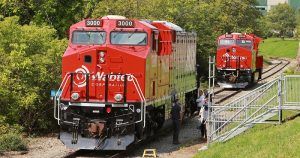 Union Pacific Railroad (UP) will start using a higher biodiesel blend in the locomotives it has acquired from Wabtec. This collaboration will help the US rail operator to increase the percentage of low-carbon fuels consumed to 10% of its total diesel consumption by 2025 and 20% by 2030.
Union Pacific Railroad (UP) will start using a higher biodiesel blend in the locomotives it has acquired from Wabtec. This collaboration will help the US rail operator to increase the percentage of low-carbon fuels consumed to 10% of its total diesel consumption by 2025 and 20% by 2030.
Following the agreement between the two companies, Union Pacific will begin testing a biodiesel blend comprising B20 biodiesel and R55 renewable diesel on trains powered by Wabtec FDL engines operating in California in the second quarter.
As testing progresses, it is anticipated that higher percentages of biofuels will be used. The project will help Union Pacific meet its science-based target to reduce greenhouse gas emissions 26% by 2030 and reach its ultimate goal of net-zero emissions by 2050.
“Increasing the use of renewable diesels and biofuels currently represents the most promising avenue to help Union Pacific meets its environmental goals. We want to drive emissions down as quickly as possible, and we believe this new project with Wabtec will make a difference,” Beth Whited, Union Pacific’s Executive Vice President for Sustainability and Strategy said.
Wabtec locomotives were previously approved for B5 R30 – 5% biodiesel and 30% renewable diesel – for locomotive engines. Biofuel is a domestically produced, clean-burning, renewable substitute for petroleum diesel. This renewable fuel increases energy security and improves air quality.
UP has an ambitious ESG (environmental, social and governance) initiative for 2030 which includes comprehensive actions to achieve GHG emissions target consistent with science-based targets, waste initiatives supporting a circular economy, and addressing ongoing habitat loss and the need for clean water due to growing populations and urban sprawl. In 2021 the Science Based Targets Initiative approved UP’s targets to reduce absolute scope 1 and 2 GHG emissions from its operations 26% by 2030 against a 2018 baseline.
To achieve its objectives to reduce its carbon footprint, the rail operator has signed contracts to purchase 20 battery electric locomotives for testing in yard operations. The first vehicles will arrive in late 2023 with complete delivery by late 2024.
Share on:



